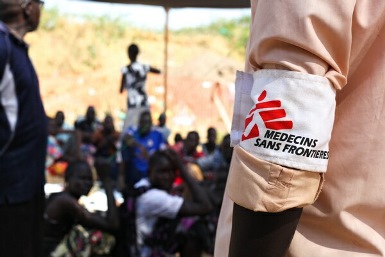MSF pulls out essential staff amid military offensives in Unity state
May 9, 2015 (JUBA) – The international medical charity, Médecins Sans Frontières (MSF) on Saturday announced it was pulling out essential from South Sudan’s Unity state amid reports of an imminent attack in Leer between the country’s rival forces.

“We must sound the alarm on the grim situation in southern Unity state,” Pete Buth, deputy operations director for MSF said in a statement extended to Sudan Tribune.
“We cannot stand by and watch as civilians and medical facilities are attacked again. All warring parties must take immediate steps to ensure that civilians, as well as humanitarian staff, their facilities and vehicles are not targeted in fighting,” he added.
Last year, MSF hospital in Leer, which has served the community for 27 years, was burnt and looted when the town was attacked. National staff fled into bushes, carrying critically ill patients on their backs, after the attackers stole MSF vehicles.
“We hope that we do not see a repeat of what happened in January 2014 when fighting forced thousands of people – including our local staff who took along dozens of critically ill patients – to hide in the swamps with their families,” said MSF’s head of mission, Paul Critchley.
“When our staff members were able to return some months later, we found the hospital burnt, the operating theatre destroyed, and our supplies looted,” he added.
As a result, patients were not only deprived of care, but ongoing treatment for conditions such as HIV, TB and Kala Azar was interrupted. Patients and staff living in the open in the swamps were forced to subsist on roots and wild fruit, drinking dirty swamp water, making them more vulnerable to malaria and diarrhea diseases.
In March 2015, MSF reportedly medical staff admitted 264 inpatients in the Leer hospital and managed 6473 outpatients and 1116 malnourished children from Leer town and its surroundings.
“Today, we withdraw again with a heavy heart, because we know how civilians will suffer when they are cut off from critical, lifesaving medical care,” said Critchley.
“We call on all armed actors to show unconditional respect for our patients, medical facilities and staff,” he added.
(ST)
